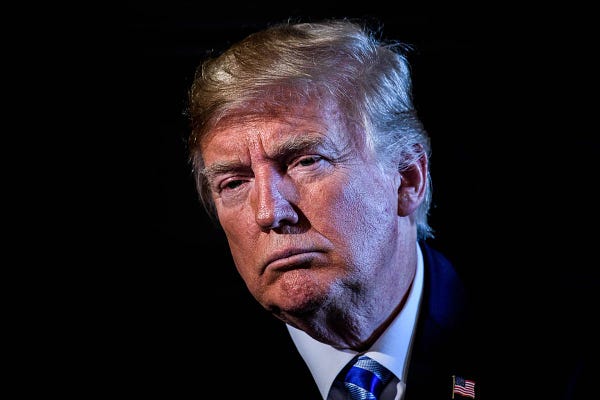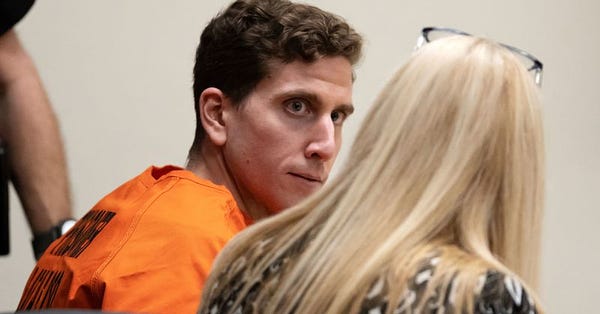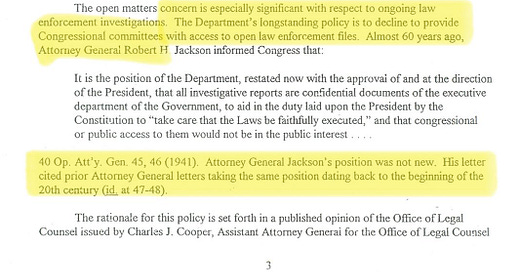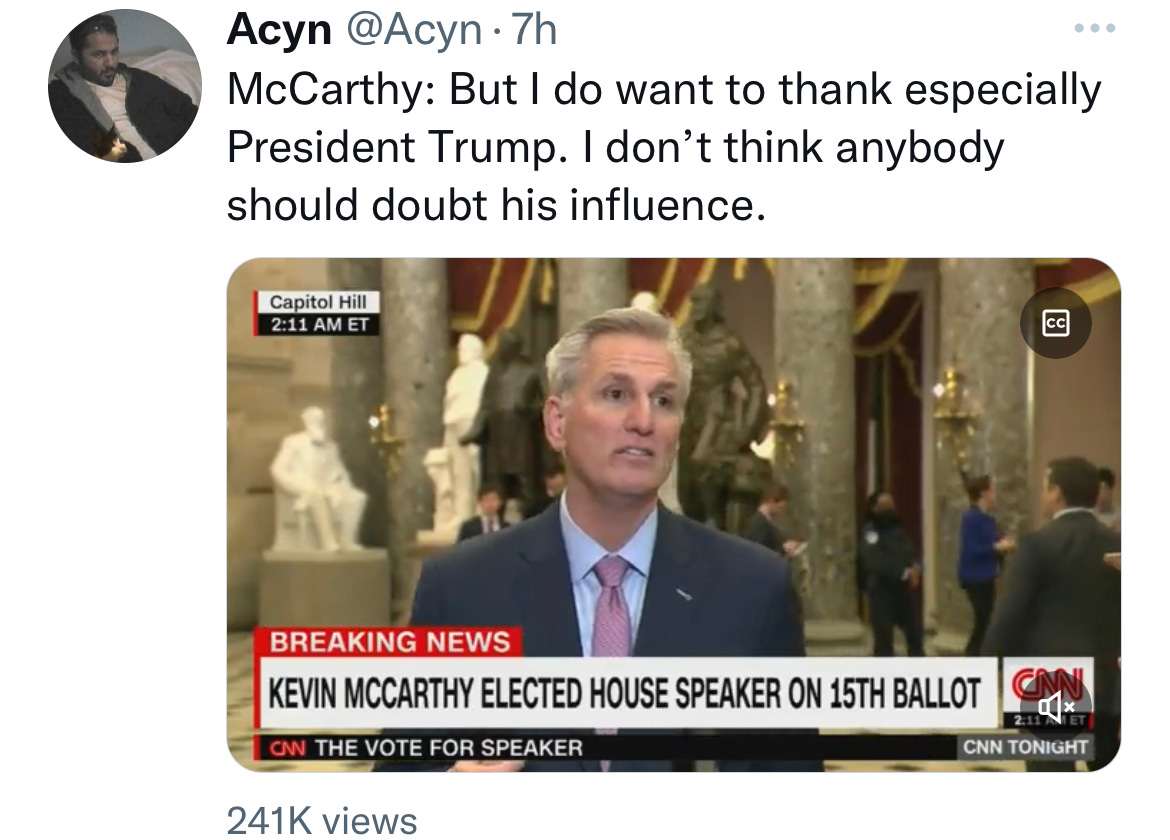One thing we already know about 2023: it’s not going to be boring. We’re already off to quite the start. Here’s what I’m focusing on for the week ahead, and there’s a lot of it!
As I wrote on Sunday, one of the items included in the House of Representatives rules resolution that will be voted on Monday is a resolution entitled “Establishing a Select Subcommittee on the Weaponization of the Federal Government.” The proposed investigative committee would operate as a subcommittee of the House Judiciary Committee, which is due to be led by Jim Jordan. While there’s nothing wrong with congressional oversight of the executive branch—in fact, it’s an essential element of the balance of power under our Constitution—this proposal goes far beyond legitimate oversight. It is by parts revenge and interference. Read the six-page resolution here.
The subcommittee will be composed of a chair (Republican) and a ranking member (Democrat), with no more than 13 members (which can include delegates or the Resident Commissioner of Puerto Rico; as we discussed on Sunday, there are non-voting members in the House from territories and the District of Columbia in addition to elected representatives). The resolution says that the speaker is to appoint the members, and “not more than 5 shall be appointed in consultation with the Minority Leader.” In other words, the ranking member plus five Democrats, along with the chair and eight Republican members.
So we’ll be looking for the appointment of members to the select subcommittee, perhaps as early as this week. I’m sure Jordan wants to get this underway. Don’t look for Democrats to make the same mistake Republicans did in refusing the participate in the January 6 committee. Democrats will send their best and brightest, and likely a number of old DOJ hands who will be able to call out Republican members if they exceed the bounds of legitimate oversight, as they inevitably will, given their rhetoric in the run-up to this. Of course, that’s likely to fall on deaf ears.
Will there be limits on who Republicans can appoint? For instance, can members who were involved with Trump in efforts to block the certification of the Electoral College vote serve? Nancy Pelosi refused to seat Republican members who were potential witnesses to or subjects of the investigation on the January 6 committee. That’s how the committee ended up with only two Republicans, Liz Cheney and Adam Kinzinger, who agreed to participate. Then-minority leader Kevin McCarthy pulled out from participating after Pelosi objected to his selection of Jim Jordan and Jim Banks, (R-IN). Both Banks and Jordan opposed certifying the results of the 2020 presidential election. There’s no indication at this point that Republicans will exclude any of their members out of concern over potential conflicts of interest.
On ABC Sunday morning, Congressman Scott Perry (R-PA) said he wouldn’t recuse himself from the committee. “Why should I be limited? Why should anybody be limited just because someone has made an accusation? Everybody in America is innocent until proven otherwise,” said the congressman who promoted Trump’s false claims of voter fraud, was an integral part of Trump’s efforts to subvert DOJ, and refused to testify pursuant to a subpoena he received from the January 6 committee.
But there is precedent in the House for a member who is under investigation by DOJ to step aside. Matt Miller, who served as Attorney General Eric Holder’s spokesperson, noted on Twitter today that when Appropriations Subcommittee chair Alan Mollohan was under investigation, he recused himself from any funding matters related to criminal investigations because the subcommittee controlled DOJ’s funding. It’s uncertain whether any members of Congress have been advised they are targets of DOJ’s investigation, but some of them do fall fairly within its ambit, especially members who participated in meetings with Trump or were in direct communication with Mark Meadows or others who were central to Trump’s plan to interfere with the certification of the vote. We don’t let witnesses sit as judges or on juries; they recuse. The conflict of interest is apparent in such a case as a matter of common sense. And if Jordan goes too far here, he will be handing Democrats an argument regarding committee bias that will be easy for people with open minds to understand.
The resolution that will establish the subcommittee includes provisions that explicitly authorize the review of “ongoing criminal investigations.” It also authorizes the subcommittee to access any classified/national security information that would go to the House Intelligence Committee from any of the intelligence community agencies. Just in case there’s any confusion about who’s going to be in the driver’s seat on this one, the power to authorize subpoenas for the panel will be in the hands of Judiciary chairman Jim Jordan.
Let’s be clear about what this is. These measures go far beyond the legitimate scope of oversight. Reviewing criminal cases while they’re in progress, which DOJ won’t permit (although it will be forced to waste a lot of time and resources fending off the committee’s requests), would overstep Congress’s bounds and violate the separation of powers. Republicans know this, but they are making it up as they go along, aggressively trying to tarnish the public’s opinion of DOJ, as Trump did, in an effort to blunt the force of any indictments DOJ may ultimately issue. This is little more than a mechanism for House Republicans to try to interfere with any investigations into Trump, or any other Republicans, like George Santos or Matt Gaetz, who may be the subject of non-January-6-related matters. Jordan will be able to issue subpoenas regarding the Hunter Biden investigation, which is being handled by a Trump-holdover U.S. Attorney in Delaware to try to embarrass President Joe Biden and argue that his Justice Department is giving favorable treatment to his son, which it clearly isn’t doing.
DOJ doesn’t turn over material that is part of an ongoing investigation. That long-standing policy, which ensures the integrity of criminal investigations, was documented in a letter written in 2000 by then-Assistant Attorney General Robert Raben to John Linder, then chair of the House Rules Subcommittee. You can read the full Linder letter here, and there’s an excerpt below.
Don’t expect DOJ to salute and comply with the subcommittee if it makes improper requests, no matter how nasty things get. Instead, expect to see witnesses subjected to contempt proceedings, with DOJ’s proper refusal to turn over case material ultimately used as a pretext to impeach Attorney General Merrick Garland (spoiler alert: he won’t be convicted in the Senate). If DOJ were to obtain indictments that included members of the House, defendants will portray them as revenge for the committee’s work. But House Republicans will find themselves in a position—which would be awkward for anyone acting in good faith—of having declined to respond to legitimate subpoenas from the January 6 committee, only to insist DOJ and intelligence community officials respond to subpoenas that violate separation of powers.
One thing we do know for certain is who the new speaker is beholden to for his job. Hopes that Trump’s influence was waning may have been overly optimistic, at least where House Republicans are concerned. There is some suggestion it was Trump’s last-minute calls to right-wing members of the House that won McCarthy his very narrow victory. Trump still holds sway over his people. McCarthy received his reward for bending the knee to Trump at Mar-a-Lago in the wake of the insurrection and returning to the Trump fold, after originally saying Trump bore responsibility for the events of that day. We’ll watch how that plays out for him over time.
Liz Cheney got in the final word, retweeting McCarthy’s comments and writing, “ ‘Just say the election was corrupt and leave the rest to me and the Republican congressmen.’ Donald Trump to the Acting Attorney General and Acting Deputy AG. December 27, 2020.”


In other legal developments for the week ahead:
Michigan AG reopens a criminal investigation into Trump
In Michigan, Attorney General Dana Nessel apparently lacks confidence that Special Counsel Jack Smith will issue indictments regarding the fake elector plot in her state. She has reopened her criminal investigation into how fake electors came to sign a certificate claiming former President Donald Trump won the state in the 2020 election when he did not. Nessel had previously referred the matter to the Justice Department, but she expressed concern that a year had passed with no action in reopening her investigation. “What we have seen from the January 6 committee is an overwhelming amount of evidence. I thought that there was already a substantial amount of evidence in that case. But now, there is just clear evidence to support charges against those 16 false electors, at least in our state,” she said.
So far, no reaction from DOJ.
It is not clear that an indictment in Michigan would reach the former president or his allies. It could be limited just to electors who submitted false documents. But this is a good time to flag that the special grand jury in Fulton County, Georgia, appears to have wrapped up its work and there could be news at any time.
Progress in the special counsel’s investigation?
There were, however, reports that special counsel Jack Smith has expanded his team to include two former colleagues, Ray Hulser, who previously led the Justice Department’s public integrity section, and David Harbach, who was Smith’s deputy when he led public integrity and has more recently represented former FBI Director James Comey. Both have experience with complex public corruption cases, including prosecutions of Senator Bob Menendez of New Jersey, former Virginia Governor Bob McDonnell, and former presidential candidate and Senator John Edwards.
All three of those prosecutions ultimately failed. Menendez was acquitted at trial. Edwards was acquitted on one count at trial. The jury hung on the remaining charges and DOJ decided against trying him a second time. McDonnell’s conviction was overturned on appeal by the Supreme Court based on legal defects in the government’s case.
One way to look at prosecutors who have lost cases, especially significant ones, is that they know the pitfalls; they know where to be on guard. Cases like this are inherently difficult for all the fact-based reasons we’ve been discussing for months, as well as legal issues that appellate courts may view as impairing convictions. Still, it would be reassuring to see Smith assemble a group of prosecutors with diverse experience and backgrounds who can bring different types of insight to bear on issues of who, whether, and how best to indict and prosecute what inevitably would be very difficult cases. He does have a number of prosecutors who were already work on these cases on his team, but DOJ has declined to release a list that includes all of them, out of concern for protecting them.
Also with regard to the special counsel’s work, an interesting report from Bloomberg, which says the special counsel is close to making decisions. That would be remarkably fast unless it’s limited to Mar-a-Lago. We’ll have to wait and see.


Kohberger due back in court in murders of four Idaho students
Bryan Kohberger, the graduate student charged in the murder of four University of Idaho students, was arrested at his parents’ Pennsylvania home and returned to Idaho last week to face charges. He is due back in court on Thursday to enter a plea. So far, Kohberger has maintained his innocence, and his family expresses sorrow and support for the families of the murdered students in a statement they released. A court order now prohibits both prosecutors and the defense from commenting beyond the public records of the case.
But an the affidavit filed with the court is full of detail on the evidence that a team of federal, state, and local investigators, working together, was able to assemble. The evidence includes DNA from a knife sheath recovered in the home, cellphone data that places Kohberger in the area the morning after the killings, and surprise eyewitness testimony from another resident of the home who came face to face with the masked killer and was able to relay his height to police.
The murders took place on November 13, 2022. Local law enforcement came under increasing criticism as time passed without an arrest. The affidavit makes clear they were slowly building a case and taking investigative steps designed to acquire evidence without spooking the man they believed was responsible. The story of this investigation is an example of law enforcement building its case quietly, below the radar screen, only to surprise the public when arrests are made without warning.


Cartel leader Ovidio Guzmán López, the son of El Chapo, has been arrested in Mexico
Guzmán López was previously arrested in 2019, a bungled effort that resulted in his release after his forces engaged in urban warfare that terrified local citizens. The United States is offering a $5 million bounty for him. Guzmán López is charged in the U.S. with conspiracy to traffic cocaine, methamphetamine, and marijuana into the U.S. The State Department says there is information that he ordered a number of murders.
After Guzmán López’s arrest, Mexico’s foreign minister, Marcelo Ebrard, said any extradition would not be immediate, both because of the formalities in that process and because Guzmán López is the subject of ongoing legal proceedings in Mexico. On Friday, a judge in Mexico halted extradition proceedings pending an appeal by Guzmán López.
There are lots of questions about how this will move forward and whether U.S. prosecutors will ever get their hands on Guzmán López. President Biden is slated to meet with Mexican president Andrés Manuel López Obrador in Mexico next week. There is every reason to believe he will view bringing Guzmán López to justice as a priority. Guzmán López and the Sinaloa Cartel are responsible for much of the illegal flow of drugs into this country from Mexico, including fentanyl.
DEA Administrator Anne Milgram characterized the threat that drug poses in the United States like this last April: “Fentanyl is killing Americans at an unprecedented rate. Already this year, numerous mass-overdose events have resulted in dozens of overdoses and deaths. Drug traffickers are driving addiction, and increasing their profits, by mixing fentanyl with other illicit drugs. Tragically, many overdose victims have no idea they are ingesting deadly fentanyl until it’s too late.”
Sentencings this week in the Manhattan DA’s case
On Tuesday, Trump Organization CFO Allen Weisselberg will be sentenced in a Manhattan courtroom. On Friday, it will be the turn of the Trump Corporation and the Trump Payroll Corp. Corporations, obviously, get fined. No one goes to prison when they are convicted.
The big question on the table is whether the Manhattan DA has a resurgent investigation into the former president himself and whether we may get any whiff of that here. In December, Manhattan DA Alvin Bragg hired former DOJ official Matthew Colangelo, who previously worked for New York AG Letitia James. While there, he led teams that prevailed against the former president in litigation. He oversaw the civil case that sounded the death knell for the former president’s charitable organization, the Trump Foundation, after a judge found evidence of rampant fraud and misconduct.
Full disclosure, Colangelo is an Obama-era DOJ colleague of mine. I think very highly of him, and if there is a case to be made here—Bragg declined to comment on what matters Colangelo would be working on when he hired him—he’ll be an important player on the team.
In the separate investigation being conducted by the New York AG, the judge denied Trump’s motion to dismiss James’s $250 million civil suit for fraud in lying about the values of their buildings. The Trumps will have to prepare for trial, but it’s a ways off, starting October 2, 2023.
E. Jean Carroll’s defamation cases against Trump
This case involves E. Jean Carroll’s lawsuit, alleging Trump defamed her after she disclosed that he raped her in a department store dressing room in the 1990s in New York City. Trump denied the rape, said she wasn’t his type, and was only making the claim to sell books. The lawsuit is taking place in New York, but the D.C. Circuit Court of Appeals will sit en banc (the full court, not a three-judge panel) for oral argument on Tuesday, to decide a legal issue that the Second Circuit Court of Appeals, which covers New York, referred to them. The case is scheduled for an April trial in New York.
Trump has already been deposed in this case, despite his best efforts to put it off until after the D.C. appeals court ruled. But the appeal in D.C. is critical. DOJ is arguing that it should be substituted for Trump as the defendant because he was a federal employee at the time he made the statements. This is routine when federal employees are sued, but the conduct they are accused of must also have been within the scope of their employment. DOJ says Trump’s comments were made in response to reporters’ questions while he was at the White House, which was part of his job. Because the federal government is immune from suit for defamation, a ruling in their favor would, as a practical matter, end the lawsuit.
A federal appeals court in New York has already ruled that Trump was a federal employee at the time he made his comments. But the Second Circuit believed the Court in the District of Columbia was best suited to determine the state of D.C. law regarding whether Trump acted within the scope of his employment when he made his comments. So they referred that question to the D.C. Court, which will hear from both sides on Tuesday.
There’s a twist, however. Trump recently repeated the defamatory statements. The repetition, now that he’s no longer president, makes his argument that they were made in his role as president even weaker. He called Carroll’s claim “a Hoax and a lie” in a post on Truth Social, writing “and, while I am not supposed to say it, I will. This woman is not my type!”
On Thanksgiving, Carroll filed a second lawsuit alleging defamation and battery under a new law, the New York Adult Survivors Act, which took effect that day and allows adult sexual assault victims to file claims based on old conduct—Carroll’s allegations date back to the mid-1990s—that would otherwise be barred by the passage of time. The lawsuit says, “Trump’s false, insulting, and defamatory October 12 statement about Carroll—and his actual malice in making that statement—is fully consistent with his tried-and-true playbook for responding to credible public reports that he sexually assaulted women.”
Carroll’s attorney, Roberta Kaplan, has asked the judge hearing the first lawsuit to deem the second one a related matter and consolidate them for trial. He has not formally consolidated them but has ordered a schedule that limits the scope of discovery because of the work already undertaken in the first case, saying he would make a decision about whether to try them together later.
It seems very likely to me that the judge will ultimately consolidate the cases for trial if Carroll prevails in this week’s argument. But even if the court rules against her, and the first case she filed is dismissed, the new case will continue, and there is little reason for the judge to delay much beyond the scheduled April 17, 2023, trial date. The allegations remain the same and discovery has already been completed in that regard; it’s the legal basis for bringing the second case that is different.
One last note. Trump has a pending summary judgment brief in the first case, and Carroll’s response is due this week. On a motion for summary judgment, a defendant argues that there is no disputed, material issue of fact for a jury to decide, and the judge should dismiss the case as a matter of law. So the plaintiff’s (here, Carroll’s) responsive brief usually involves extensive citation to deposition testimony, to show that jury issues exist. If Carroll’s brief is not filed under seal, we may learn a great deal about her evidence, and Trump’s deposition testimony, later this week.
If you’re still with me after all of that, you know it’s going to be a crazy week for legal news. But I’ve got a request for you. Sunday morning, I tweeted an excerpt from Saturday’s edition of Civil Discourse that read, “Perception has a way of becoming reality & the high-schoolish display in the House showed how fragile our institutions remain. Institutions are only as stable as the people who run them. & Beyond national security, there are legitimate concerns about how the GOP will govern.” @abell_elise responded with something I think so many of us experience, whether with friends, family, or co-workers. I’d love to hear your thoughts and suggestions on how to handle situations like this. Leave them in the comments.

We’re in this together,
Joyce






Too much of the country still views our “politics” in the traditional way: right-of-center, center, and left-of-center. Why else would we now have a Republican-controlled House just two years after a seditious insurrection - led by a maniacal Republican President - that almost toppled our democracy, and after many of those same Reps voted against certifying Joe Biden’s election with no valid reason just hours after said insurrection? As long as our fellow citizens vote these idiots into office, we are going to be in grave danger of losing our democracy.
I have been dumbfounded by this “voting against my best interest” phenomenon for many years. I’m afraid a sizable segment of the population is simply stupid, and they are damn proud of it.
Tom J...bluff park, al
I'm with your friend who tweeted. While I can certainly understand that not everyone wants to talk politics every minute of every day (even I don't want to do that), it behooves us to pay close attention to what's going on, and to take whatever actions we can in order to keep our democracy from falling apart and to hold our elected officials accountable for their actions. I'm so grateful to you and others who are keeping us informed.